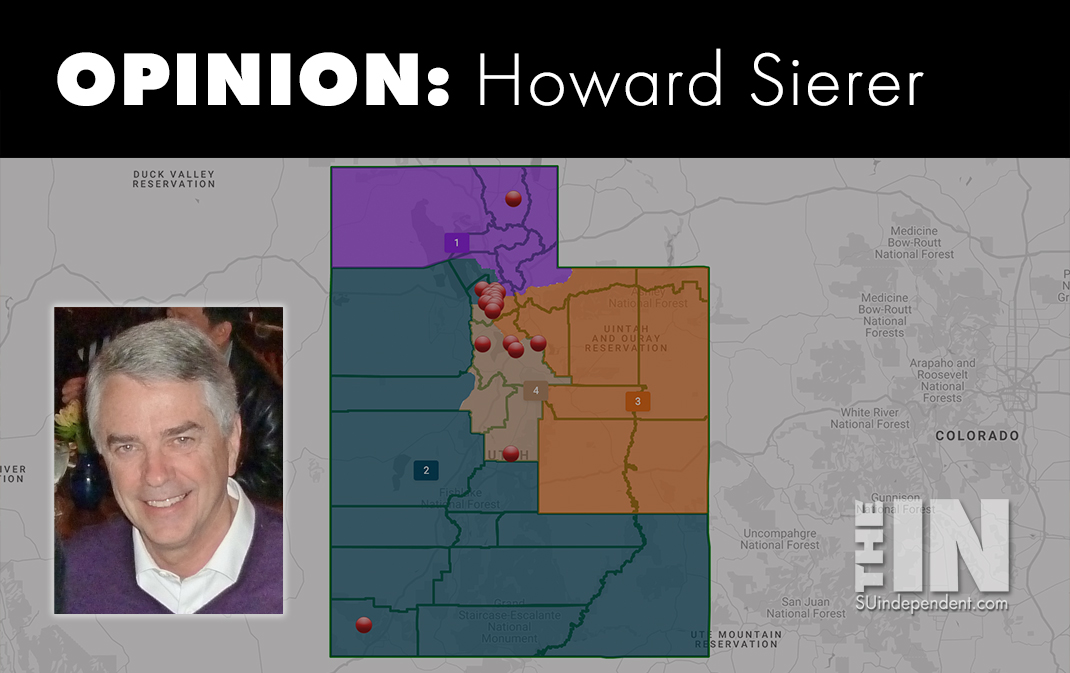
Utah’s Partisan Congressional Redistricting
Utah is a red state: we’re conservative and very likely to stay that way for decades to come. But how far should our majority-Republican state legislature go to keep a Democrat out of our congressional delegation?
The U.S. constitution empowers states to determine the “Times, Places, and Manner” of congressional elections. The Supreme Court’s “one person, one vote” decision applied the constitution’s equal protection clause to require states to create congressional districts with roughly equal populations.
As a result with each new federal census, states are required to examine their congressional district boundaries and modify them as required by the one person, one vote rule. Redistricting is underway nationwide to reflect population changes tabulated in the 2020 census.
State legislatures have long practiced gerrymandering, drawing congressional district boundaries to benefit candidates of the legislature’s majority party. While the Supreme Court forbids drawing district boundaries using race as a criterion, it ruled in 2019 that “partisan gerrymandering claims present political questions beyond the reach of the federal courts.”
Like it or hate it, gerrymandering is here to stay for the foreseeable future.
A number of states including Utah have made attempts to minimize the role of partisan politics in drawing new boundaries by creating non-partisan commissions. Most of these efforts, including Utah’s, have fallen short: the temptation for legislative majorities to maintain political power is just too strong.
The Utah Independent Redistricting Commission was voted into existence in 2018. As required by its mandate, the commission proposed three possible congressional district maps.
The distinguishing feature of all three alternatives is that Salt Lake County would be kept intact in a single district. Since the county contains the core of Utah’s Democratic voters, any one of the three alternatives would improve the party’s prospects for electing at least one congressional representative when compared with the existing 2010 boundaries.
As required by state law, those three alternatives were submitted to the state legislature. But instead of picking one, our lawmakers promptly rejected all three in favor of its own map, one that it had been preparing even before the commission reported.
It’s clear the legislature agreed with former U.S. Rep. Rob Bishop, a Republican commission member who resigned before the commission completed its work. He complained that five of seven commission members were from the Wasatch Front making the body “metro-centric” and favoring Democrats.
Utah was the fastest-growing state in the union from 2010 to 2020, growing 18.4 percent. With much of that growth outside of Salt Lake County, the legislature had ample opportunity to diminish Salt Lake’s political clout. And this it did, splitting parts of Salt Lake County into all four districts.
For example, those of us in Southern Utah’s Washington County will continue to be in the same congressional district as citizens in parts of Salt Lake’s East Mill Creek neighborhood located east and a little south of downtown Salt Lake City. We’ll be lumped in with the popular Lagoon amusement park and with suburbs as far north as Farmington.
Republican legislators argue that including both urban and rural areas in each district motivates our congressional representatives to consider the needs of the state as a whole instead of focusing primarily on either urban, suburban or rural priorities.
Democrats in turn argue that Salt Lake County residents are a compact urban community and deserve representation that reflects that fact. They further argue that 37.6% of Utah citizens voted for Pres. Biden and that these citizens are effectively being frozen out of congressional representation.
My sense of fair play argues for keeping Salt Lake County intact inside one of our four congressional districts. In a previous column, I supported the Redistricting Commission proposition and argued against letting the legislature establish district boundaries. I complained that “elected officials are choosing their voters. It should be the other way around.”
But my sense of fair play is tempered by the lack of same in many other states where partisan gerrymandering continues unabated. For example, California voters gave Biden 63.5% of their votes. But their House of Representatives delegation has 42 of its 53 seats, 79%, in Democratic hands, an excess of 7 Democrats.
Texas gave Trump 52.1% of its votes while 64% of its 36 representatives are Republicans. Illinois voters picked Biden on 57.5% of their ballots while 72% of their 18 representatives are Democrats.
Gerrymandering is and will likely continue to be a fact of political life. I believe that expecting Utah to unilaterally abandon it makes no more sense than eliminating our country’s armed forces as a virtuous indicator of our commitment to world peace or defunding police to demonstrate commitment to social justice.
So, while all states ought to do better, I can live with Utah’s flawed but all-too-typical election districts for at least the next ten years.
Viewpoints and perspectives expressed throughout The Independent are those of the individual contributors. They do not necessarily reflect those held by the staff of The Independent or our advertising sponsors. Your comments, rebuttals, and contributions are welcome in accordance with our Terms of Service. Please be respectful and abide by our Community Rules. If you have privacy concerns you can view our Privacy Policy here. Thank you!
Click here to submit an article, guest opinion piece, or a Letter to the Editor





Howard is correct. The Utah legislators abandonment of an independent non partisan commission to ensure a fair election happened so the dominant political party would retain control with no dissent from the American working middle class.
We are headed for what 1930s Germany tried to do in promoting a superior race theory.
Fascism.
Our troops invading the shores of Normandy were the anti fascists (confused with ANTIFA), who are mostly gone now.
When the people elect and defeat by millions of popular votes; but lose the election,we will have been reprogrammed to a fascist state.
To heck with “fair” play.
Continue to fix the vote.
Thank you Utah legislators.